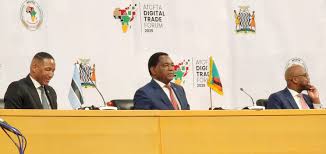The Inaugural AfCFTA Digital Trade Forum, held from May 8–10, 2025, in Lusaka, Zambia, has set the stage for the continent’s operational phase of a unified digital single market, with governments and private sector players pledging accelerated action on the AfCFTA Protocol on Digital Trade.
The event brought together Heads of State, ministers of trade, ICT, and digital economy, business leaders, tech innovators, MSMEs, and development partners from across the continent. It culminated in a powerful Call to Action to transform digital trade legal frameworks into tangible economic opportunities for African businesses, consumers, and governments.
Zambian President H.E. Hakainde Hichilema, host of the Forum, called the Protocol “a powerful catalyst for socio-economic growth” and reaffirmed Zambia’s readiness to lead in Africa’s digital transformation. “Zambia is open to digital trade and business,” he declared.
Echoing this sentiment, H.E. Duma Boko, President of Botswana, emphasized that digital trade could “rewire how our economies function—not only by making trade easier, but by making it fairer and more inclusive.”
Dr. Jumoke Oduwole, Nigeria’s Minister of Industry, Trade and Investment and Co-Champion of the Protocol, stressed the role of trust in scaling digital commerce. “The Protocol gives us legal tools, but success depends on practical delivery—protecting data, securing payments, and enabling cross-border digital platforms,” she said.
Hon. Parks Tau, South Africa’s Minister of Trade, Industry and Competition, also a Protocol Co-Champion, pointed to the need for youth empowerment, digital skills development, and inclusive financing to bring the Protocol to life.
Wamkele Mene, Secretary-General of the AfCFTA Secretariat, emphasized that now is the time for execution and investment. “We must build digital infrastructure that links rural communities with continental markets, and empower African fintechs, startups, MSMEs, and youth to scale,” he said.
With Africa’s digital economy projected to grow to US$180 billion by 2025 and US$712 billion by 2050, the Protocol is seen as a legal and economic pillar for unlocking the continent’s digital potential.
For investors, entrepreneurs, and policymakers, the signal from Lusaka was unmistakable: Africa’s digital trade revolution is not a distant vision—it is already in motion.
